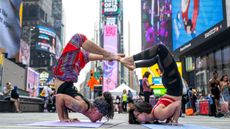What is blackfishing?
Pop star Jesy Nelson embroiled in appropriation row following release of first solo music video since quitting Little Mix last year

Former Little Mix singer Jesy Nelson has been accused of “blackfishing” in her latest music video, Boyz, which samples P Diddy’s song Bad Boy for Life and features the rapper Nicki Minaj.
In the video, Nelson, who is from Romford in east London and identifies as white British, is seen wearing grills on her teeth, has her hair in braids and “her skin is darkened in a way that makes her appear nonwhite”, reported The Guardian.
The pop star received widespread criticism following the video’s release on 8 October – her first single since quitting Little Mix in December 2020. Nelson is “not in the video as a pale-skinned, brown-haired white lady – she’s in the video as a tan-skinned, Afro-haired white lady”, brand specialist Kubi Springer told The Independent.
Subscribe to The Week
Escape your echo chamber. Get the facts behind the news, plus analysis from multiple perspectives.

Sign up for The Week's Free Newsletters
From our morning news briefing to a weekly Good News Newsletter, get the best of The Week delivered directly to your inbox.
From our morning news briefing to a weekly Good News Newsletter, get the best of The Week delivered directly to your inbox.
In a conversation on Instagram Live with Minaj, Nelson said she hadn’t intended to cause offence and that she just wanted to “celebrate” hip-hop and R&B music from the 1990s and 2000s “because it is what I love”. She added that she had been to Antigua before the shoot, which explained why her skin looked darker.
This is not the first time that Nelson has been embroiled in a blackfishing row, nor is she the only celebrity to have been accused of it; Kim Kardashian, Iggy Azalea, Selena Gomez and Ariana Grande are just a handful of the major stars who have been criticised for trying to look black by darkening their skin and adopting black hairstyles.
The term blackfishing first hit public consciousness in 2018, thanks to a viral Twitter thread by Toronto-based freelance writer Wanna Thompson. “The thread exposed something that I've known all along – white women want access to Blackness but don't want the suffering that comes along with it,” she wrote for Paper magazine that same year.
Thompson added that Instagram had become “a breeding ground” for white women wanting to capitalise off “impersonating racially ambiguous/Black women for monetary and social gain”.
What is blackfishing?
Thompson defines blackfishing as “when White public figures, influencers and the like do everything in their power to appear Black”. Speaking to CNN, she added that this could entail tanning their skin excessively “in an attempt to achieve ambiguity” or wearing “hairstyles and clothing trends that have been pioneered by Black women”.
Blackfishing creates a “dangerous paradox”, Thompson added, as it enables white people to participate in black culture without taking on “the full experience of Blackness and the systemic discrimination that comes with it”. Writing for The Guardian, author and activist Mikki Kendall described blackfishing as feeling “like blackface, albeit a version updated for the digital age”.
The term derives from the concept of “catfishing”, where a stranger creates a fictional online persona to lure someone into a relationship.
Blackfishing is different to cultural appropriation, which is defined by Oxford Dictionaries as “the unacknowledged or inappropriate adoption of the customs, practices, ideas, etc. of one people or society by members of another and typically more dominant people or society”.
On the other hand, blackfishing is “less about customs and traditions and is focused more on the appropriating of aesthetics”, explained the i news site.
What do those accused of blackfishing say?
Some, like Nelson, argue that their skin is naturally dark. When the typically blonde pop star Iggy Azalea was accused of looking darker than usual in the music video for her song I Am the Strip Club, she dismissed the claims on Twitter, writing: “I’m the same colour as I always am, just in a dimly lit room with red lights.”
And when Poland-born Instagram influencer Aga Brzostowska was accused of faking her race, she told BBC’s Radio 1 Newsbeat that her skin is naturally “not pale”.
“With things like tanning, I don’t think I’ve done anything in a malicious way. So I don’t feel like I need to stop doing something because... why would I stop doing something that’s benefitting me or that I enjoy doing?” she said.
Brzostowska added that she was not suggesting “white privilege is not a thing”, but wanted to tell her critics that “the assumptions you’re making are wrong”.
But the backlash against alleged blackfishing has led some influencers to rethink their public image. Jaiden Gumbayan, a Florida-based influencer who was criticised over her online snaps, told the broadcaster that she had realised there are “other ways of showing appreciation”.
“We can appreciate their culture without having to do or wear their hairstyles, or trying to act or be a certain way that we’re not,” Gumbayan said.
Create an account with the same email registered to your subscription to unlock access.
Sign up for Today's Best Articles in your inbox
A free daily email with the biggest news stories of the day – and the best features from TheWeek.com
-
 Magazine interactive crossword - May 3, 2024
Magazine interactive crossword - May 3, 2024Puzzles and Quizzes Issue - May 3, 2024
By The Week US Published
-
 Magazine solutions - May 3, 2024
Magazine solutions - May 3, 2024Puzzles and Quizzes Issue - May 3, 2024
By The Week US Published
-
 Magazine printables - May 3, 2024
Magazine printables - May 3, 2024Puzzles and Quizzes Issue - May 3, 2024
By The Week US Published
-
 The not-so-hidden dark side of child influencers
The not-so-hidden dark side of child influencersunder the radar Is putting children in the spotlight worth the risk?
By Theara Coleman, The Week US Published
-
 From 'thunks' to mixed reality, the future of books is interactive
From 'thunks' to mixed reality, the future of books is interactiveThe Explainer What is in store for literature in an increasingly digital world?
By Theara Coleman, The Week US Published
-
 Grammys drop Kanye from performance lineup due to 'concerning online behavior'
Grammys drop Kanye from performance lineup due to 'concerning online behavior'Speed Read
By Grayson Quay Published
-
 Why everyone’s talking about American Dirt
Why everyone’s talking about American DirtIn Depth Jeanine Cummins novel criticised as ‘cultural appropriation’ and ‘opportunistic’
By The Week Staff Last updated
-
 The meaning of woke
The meaning of wokeIn Depth School chief urges headteachers to challenge anyone who criticises young people for ‘wokeness’
By The Week Staff Last updated
-
 Five top travel trends of 2019
Five top travel trends of 2019In Depth From Instagram holidays to digital detoxes, here are next year’s hot new crazes
By The Week Staff Last updated
-
 What is the ‘falling stars’ challenge?
What is the ‘falling stars’ challenge?In Depth China’s favourite new internet trend highlights the country’s stark income inequality
By The Week Staff Last updated
-
 How does cultural appropriation work – and how can you spot it?
How does cultural appropriation work – and how can you spot it?In Depth From the West’s yoga obsession to Justin Bieber’s hair style, accusations of cultural appropriation are common
By The Week Staff Last updated